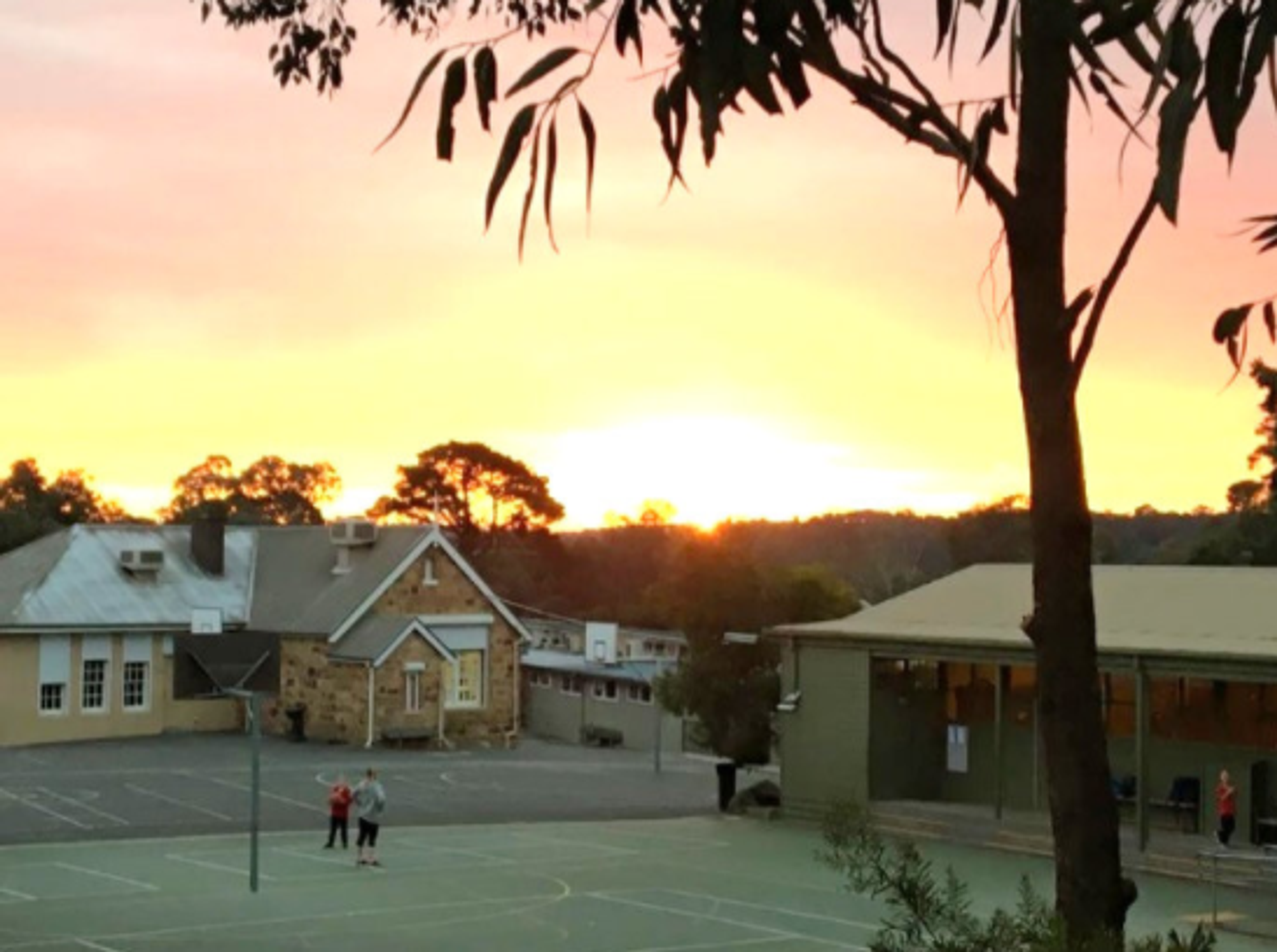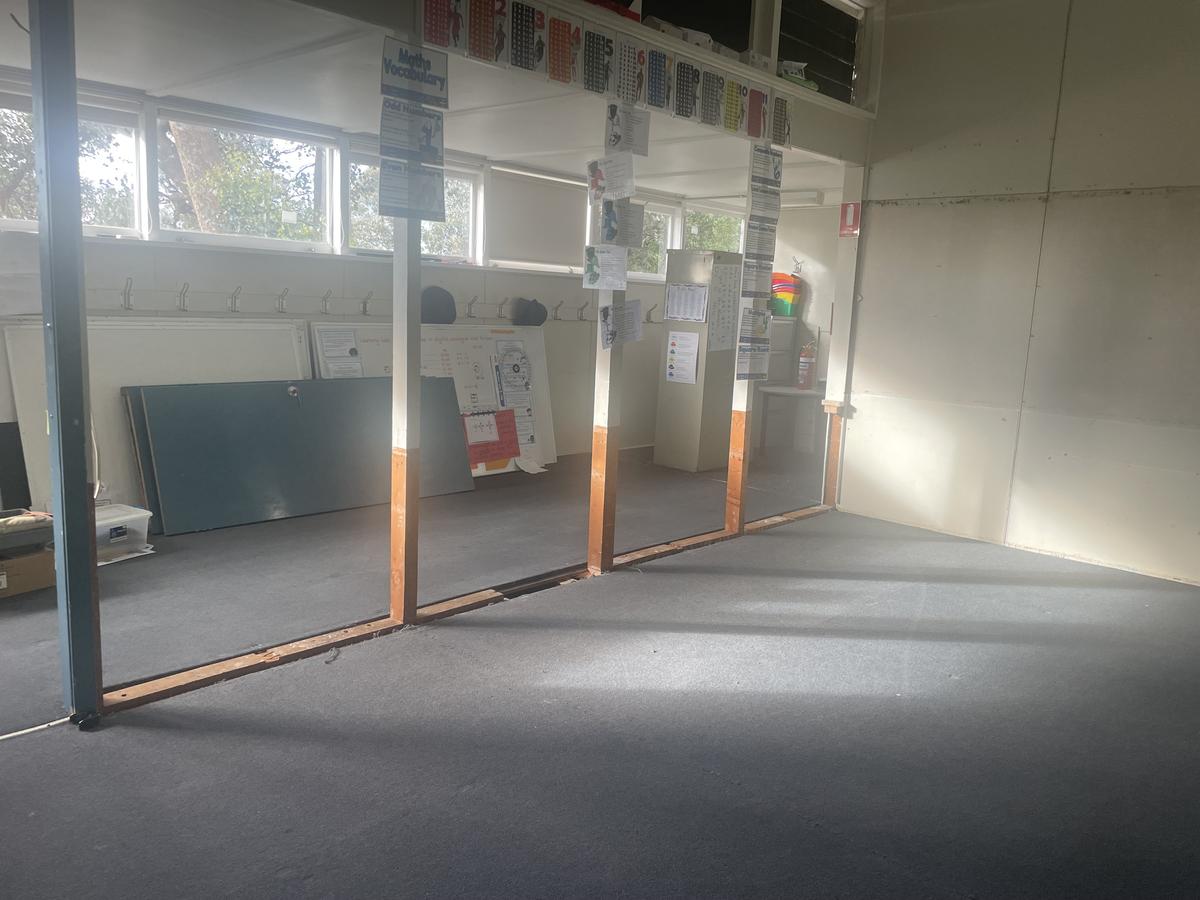Principal Message

Hello,
We are fast approaching the middle of the year and with it the winter holidays but the school will be busy. The renovations to the senior building have begun and will continue through the holidays. I thought it nice to take the community on the journey as we begin.
The walls have come down and it is amazing how big the space looks now. Old sinks, cupboards, walls and gas heaters are all gone.
We have come up with a new way to use the desktops we have and if you visit the junior building, you will now see ICT hubs in the breakout spaces for the younger students to access. Often students need a computer to publish writing or research for projects of non-fiction texts. Students will still have access to the laptops and will continue with explicit ICT lessons each week, but these pods support the work being done in
Reading, Writing and Maths.
Report Writing Terms
Our teachers are at the tail end of their reporting writing, and this week they will begin part of the proofing and editing process as they buddy read each other's reports. The final proofing will be done by me, and reports will go live for you to access via Compass on Tuesday 20th June at 4:30pm.
During Terms 2 and 4 the students undertake a range of summative assessments to give our teachers a chance to triangulate data related to where you child is on the Victorian Curriculum continuum of learning. Teachers spend many hours on report writing and take very seriously the grades that they give their students.
Students undertake testing between Week 2 and Week 5 of the reporting term. The assessments that are done can include;
- Adaptive testing in Reading and Numeracy via PAT Maths and PAT Reading. PAT Adaptive assessments create an individualised test experience for an even more precise picture of a student's achievement regardless of age or year level.
- Essential Assessment online testing in Reading, Number and Algebra, Statistics and Probability, Measurement and Geometry.
- PM benchmarking for emerging readers and Little Learners Love Literacy benchmarking
- Teacher notes from one-on-one conferences throughout the term
- Pre and Post testing in units of work
- Writing moderation - a sample of a student's writing is graded and then compared with the Victorian Curriculum as well as against other students work to ensure consistency between grades.
- Formative Assessment in the form of teacher notes and observations and lesson exit tickets.
In the report you will find a personal comment from the teacher related to your child's personal, social and emotional skills and these comments will be tailored for your child and related directly back to the Victorian Curriculum and their achievements and strengths.
The Personal and Social capabilities focus on the recognition and expression of emotions, the development of resilience, and the appreciation of diversity of gender, age, language, culture and religion. Students explore the importance of a range of social relationships, including within families, peer groups and the community.
There will be 'nutshell' statements for Reading, Writing and Numeracy which is a summary of the topics, projects and areas of the curriculum covered throughout the semester. This is a blanket statement for the class. However, statements related to what your child has achieved are written specifically for your child and the evidence the teacher has gathered about the areas of the curriculum they demonstrated they have an understanding or competency in. The Future Learning or next steps are also written individually for each student and clearly outline what the focus will be for your child/ren in Semester 2.
Parent Teacher interviews
We want parents to have a chance to read over their child’s reports and come to our parent teacher interviews with questions. Last year we ran Parent Teacher Interviews early in Term 3 rather than at the end of Term 2 and this seemed to work well. The goals that are set from Term 3 will be discussed in these interviews as will their progress, academically and in relation to personal, social and emotional growth and needs.
You will receive a Compass message soon to book your interview time. We will run onsite and the option of online interviews as we now have a mix of people who prefer one from the other.
Warrandyte High School music performance
On Thursday some students from Warrandyte High School visited us to demonstrate their musical talents. The WHS Choir and their band performed for the whole school and showed off their talents. The students enjoyed listening to the saxophones, trumpets, trombones, clarinets and flutes. Hopefully some of them have gone away considering the idea of learning an instrument themselves, either now or when they are in high school.
Understanding ADHD in schools
Last week I listened to a webinar about Attention Deficit Hyperactivity Disorder (ADHD) in schools and building inclusive practices. It is always our goal to work towards inclusive classrooms at WPS. With 1 in 20 children across Australia being diagnosed with ADHD our schools are having to learn to adapt. ADHD is a somewhat controversial diagnosis and there is often a stigma attached to it that has meant that the impact of ADHD on individuals and families is often unrecognised. Many perceive ADHD to be a behavioural disorder, however, the truth is that it is a neurodevelopmental disorder. Based on the statistics it is more than likely there is at least one child with ADHD in every classroom. Our experience as educators is that the figure is higher and that there is considerable variance in the types of behaviours seen.
ADHD is characterised by persistent patterns of inattentive, impulsive, and sometimes hyperactive behaviour, and is frequently accompanied by emotional regulation challenges. According to the American Academy of Child Adolescent Psychiatry , a child with ADHD “may often be easily distracted, make careless mistakes, forget things, have trouble following instructions, or skip from one activity to another without finishing anything.” The Diagnostic and Statistical Manual for Mental Disorders also suggests that a child with ADHD will be engaged in constant movement, chatter, fidgeting, and energy expulsion, and behave impulsively by failing to consider consequences, interrupting others, and risk-taking.
Children who exhibit ADHD symptoms are more likely to:
- Struggle with school. This is nothing to do with their cognitive ability and more to do with their capacity to focus on tasks. Teachers employ common strategies here to break down the tasks into smaller steps.
- Struggle with friendships. Students with these challenging behaviours are the ones who don't get invited to the birthday parties, sleepovers, or catch ups on the school holidays. Because they can't inhibitthemselves, they can talk over people and their communication is often overdone in their attempts to make and keep friends.
- Struggle with big emotions. Having a problem with inhibition and regulation means that emotional responses to seemingly small things can often be very difficult to control.
- Struggle with big behaviours. Impulsivity and inattention mean that if anything is uninteresting, a child is simply going to move away or move on from it. They’re looking for something worthy of their focus so anything they perceive as boring blocks them. Lack of inhibition combined with big emotions can mean explosive behaviour. In the classroom the trick for a teacher is to spot the triggers or predict where the student might be overwhelmed or struggle to maintain their focus or resist their impulses. Transitions to and from classes, sudden changes to routine and noisy learning environments are just a few of the common triggers.
- Struggle with self-esteem. When they are constantly being told to stop or questioning their competence, they can question their worth which increases their risk of depression and anxiety.
And it can be very tough on the parents as well. It isn't uncommon for parents who have children with ADHD to feel confused, exhausted, stressed, judged and just plain sad. In my experience as a school leader parents have to go on a very difficult journey as they learn to accept, adapt and live with a child with ADHD. They see other families seemingly thriving and feel like they have somehow failed. I can say though, that I have yet to meet a family that does not have something going on in their world.
The link below is a video guide for parents who have children with ADHD or for anyone who wants to learn more about the disorder and its impact on families.
https://schools.happyfamilies.com.au/a-parents-guide-to-raising-a-child-with-adhd/
Enjoy your long weekend.
Take care,
Nieta








